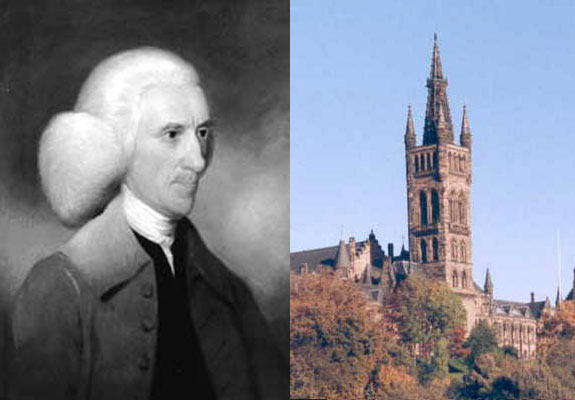October 18
Alexander Wilson, who combined the craft of typefounding with the discipline of astronomy—a unique admixture of talents—died upon this day in 1786. Prior to the establishment of Wilson’s typefoundry, there had been no typefounding in Scotland. Through his efforts the craft attained notable success in supplying types for both Scottish and English printers and also for many printing offices in the American colonies.
Alexander Wilson was born in St. Andrews in 1714. As a young man he went to London to learn the medical profession, becoming assistant to a surgeon. At this period he became excited about science, with emphasis upon astronomy. He spent a great deal of his time with other scientific amateurs, among whom was Lord Isla, who—attracted by Wilson’s zeal in scientific matters—offered to sponsor his career.
However, an accidental encounter with the typefounding business occurred just about this time when Wilson visited a foundry with a friend who wished to purchase some type. Thomas Curson Hansard, writing in his manual, Typographia, published in 1825, discusses this incident, using as a source information he received from the Wilson family:
“While he was thus passing his time in a manner which he considered comfortable for one at his first entrance upon the world, a circumstance accidentally occurred which gave a new direction to his genius, and which in the end led to an entire change of his profession. This was a chance visit made one day to a letter-foundry with a friend, who wanted to purchase some printing types. Having seen the implements and common operations of the workmen usually shown to strangers, he was much captivated by the curious contrivances made use of in prosecuting that art.”
Wilson sought the approval of Lord Isla, and upon receiving an enthusiastic response, he enlisted the aid of another young Scotsman, John Baine. Returning to St. Andrews, the two men opened the first typefoundry in Scotland. It was an immediate success, since the Scottish printers had been completely dependent upon the London founders.
In 1749 the partners agreed to go their respective ways, with Wilson becoming the sole proprietor of the foundry. He had become friendly with many of the distinguished faculty members of the University of Glasgow, particularly the printers to the University, Robert and Andrew Foulis. Wilson collaborated with the Press of the University in the production of Greek types for a series of classic texts being produced. These are now considered to be the finest monuments of Greek typography to be printed in Great Britain.
In 1760 Wilson was appointed to the Practical Astronomy Professorship at Glasgow University. A year or so later the foundry was brought into the environs of the University and managed by his two sons, who added still further to its reputation. During Wilson’s entire tenure as head of the foundry, not a single type specimen is known to have been issued. As this covered a period of some thirty years duration, it represents a conspicuous lack from a typefoundry of such repute.
Further Reading
Robert & Andrew Foulis, the Foulis Press, and Their Legacy by George Fairfull Smith.
Robert & Andrew Foulis and the Glasgow Press by David Murray. A digital book available for online reading at the Internet Archive.
